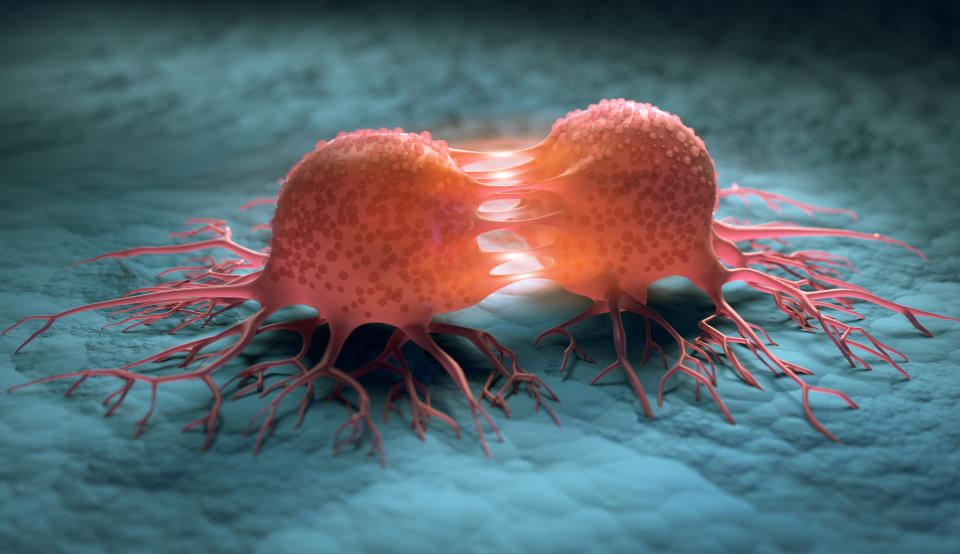Vitamin D may ward off advanced cancer, study suggests

Taking vitamin D may protect against advanced cancer, research suggests.
The so-called sunshine supplement has long been linked to good health, with previous studies revealing people who live near the equator are less likely to develop life-threatening tumours.
Animal and laboratory studies have suggested vitamin D may slow cancer progression, however, human trials have thrown up mixed results.
To learn more, scientists from Brigham and Women’s Hospital in Boston, in the US, looked at more than 25,000 healthy adults over around five years.
Read more: Vitamin D linked to reduced risk of coronavirus death
Results suggest taking a high dose of vitamin D reduced the risk of developing advanced cancer by 17%.
Although unclear exactly how the supplement may halt tumour development, vitamin D is known to help regulate calcium and phosphate levels, which keep bones, teeth and muscles healthy.
It may also dampen inflammation that interferes with an immune response.

“These findings suggest vitamin D may reduce the risk of developing advanced cancers,” said study author Dr Paulette Chandler.
“Vitamin D is a supplement that’s readily available, cheap and has been used and studied for decades.”
One in two people born after 1960 in the UK will statistically develop cancer at some point in their life.
Read more: Why you should take vitamin D during lockdown
Advanced cancer is typically defined as a disease that cannot be cured, however, treatments may help to extend a patient’s life or ease their symptoms.
It may also be used to describe a tumour that has spread beyond its original site, known as metastatic cancer.
Watch: Vitamin D may ease severe eczema in children
In 2018, the Brigham scientists analysed the association between vitamin D and cancer in a group of men aged 50 or over and women aged 55 or over.
The participants were divided into four groups. The first took 2,000 International Units (IU) – or 50 micrograms (μg) – of vitamin D plus 1g of marine-derived omega-3 fatty acids a day.
A vitamin D dose is expressed in IU or micrograms, with 1μg being equivalent to 40 IU.
Between October and early March when sunshine is sparse, the NHS recommends adults take 10μg – or 400 IU – of vitamin D a day.
Read more: How to treat winter skin
The study’s second group took vitamin D with a placebo, the third were given omega-3 plus a placebo and the fourth took two sugar pills.
No significant difference in the onset of cancer was found between the different groups, however, the scientists did observe a reduction in tumour-related deaths among those who took vitamin D.
Honing in on this observation, the scientists carried out a secondary analysis on how the sunshine supplement may prevent advanced or life-threatening cancer.
Of the more than 25,000 participants, 1,617 were diagnosed with cancer over the next five or so years.
Almost 13,000 participants received some form of vitamin D, of whom 226 were diagnosed with advanced tumours, compared to 274 cases in the placebo group – a 17% difference.
Vitamin D deficiency is said to be common among cancer patients, with one study reporting nearly three-quarters (72%) miss out on the nutrient.
The scientists then analysed the participants according to their weight.
The results, published in the journal JAMA Network Open, revealed that of the more than 7,000 who took vitamin D and had a normal body mass index (BMI) – defined as less than 25 – 58 developed advanced cancer.
This is compared to 96 of the healthy-BMI participants who took a placebo and were later diagnosed with the disease.
Having a healthy BMI and taking vitamin D was therefore linked to a 38% reduced risk of developing advanced cancer, suggesting a person’s weight influences how the sunshine supplement protects against the disease.
This result was not statistically significant, however, which means the outcome could have come down to chance.
Nevertheless, obesity and the inflammation it causes have previously been found to reduce the effectiveness of vitamin D.
Type 2 diabetes trials have also demonstrated vitamin D is more beneficial among people who are a normal weight, while no advantage has been observed when obese patients take the supplement.
Although unclear exactly how a person’s BMI may influence vitamin D’s action, carrying an excessive amount of weight may lower the sensitivity of a cell’s receptor for the supplement.
Obesity may also alter how vitamin D signals within the body.
Carrying an excessive amount of weight is also a known risk factor for several types of cancer.
“Our findings, especially the strong risk reduction seen in individuals with normal weight, provide new information about the relationship between vitamin D and advanced cancer,” said Dr Chandler.
“[This] supports the ongoing evaluation of vitamin D supplementation for preventing metastatic cancer; a connection that is biologically plausible.
“Additional studies focusing on cancer patients and investigating the role of BMI are warranted.”
Watch: Pregnant women’s vitamin D levels linked to child’s IQ


